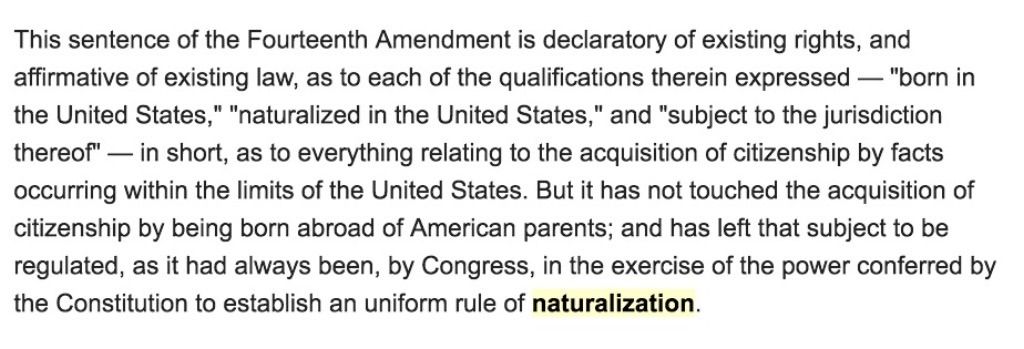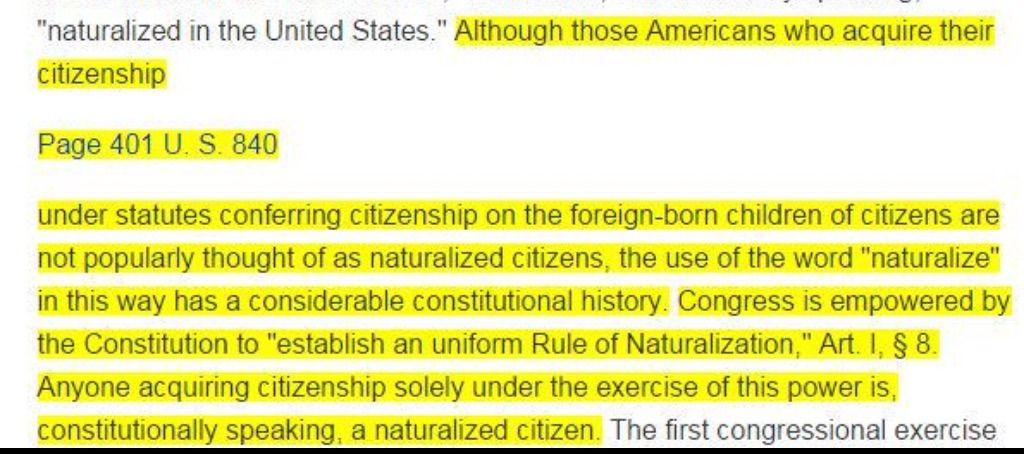
Posted on 02/05/2016 11:33:35 AM PST by Enlightened1
Who is a natural-born citizen? Who, in other words, is a citizen at birth, such that that person can be a President someday?
The 14th Amendment defines citizenship this way: “All persons born or naturalized in the United States, and subject to the jurisdiction thereof, are citizens of the United States and of the State wherein they reside.” But even this does not get specific enough. As usual, the Constitution provides the framework for the law, but it is the law that fills in the gaps.
Currently, Title 8 of the U.S. Code fills in those gaps. Section 1401 defines the following as people who are “citizens of the United States at birth:”
•Anyone born inside the United States *
•Any Indian or Eskimo born in the United States, provided being a citizen of the U.S. does not impair the person’s status as a citizen of the tribe
•Any one born outside the United States, both of whose parents are citizens of the U.S., as long as one parent has lived in the U.S.
•Any one born outside the United States, if one parent is a citizen and lived in the U.S. for at least one year and the other parent is a U.S. national
•Any one born in a U.S. possession, if one parent is a citizen and lived in the U.S. for at least one year
•Any one found in the U.S. under the age of five, whose parentage cannot be determined, as long as proof of non-citizenship is not provided by age 21
•Any one born outside the United States, if one parent is an alien and as long as the other parent is a citizen of the U.S. who lived in the U.S. for at least five years (with military and diplomatic service included in this time)
•A final, historical condition: a person born before 5/24/1934 of an alien father and a U.S. citizen mother who has lived in the U.S.
* There is an exception in the law — the person must be “subject to the jurisdiction” of the United States. This would exempt the child of a diplomat, for example, from this provision.
Anyone falling into these categories is considered natural-born, and is eligible to run for President or Vice President. These provisions allow the children of military families to be considered natural-born, for example.
http://www.usconstitution.net/consttop_citi.html
I really don’t know.
No eligibility case ever went as far as Obama’s. And there were plenty of lawsuits. Nearly 50 in all.
They were all dismissed. Lack of Standing.
I strongly suspect the suits against Ted (there are 2 or 3 so far) will meet the same fate.
Dismissed.
What you posted says something about Naturalization but not Natural Birth
If all you need is 1 U.S citizen period...., then why would they add that?
Again another spectacular counter point......(sarcasm off)
Read Rogers v. Bellei 401 U.S. 815 (1971)
That’s why I ask
https://supreme.justia.com/cases/federal/us/401/815/case.html
No.. the problem is the final answer WILL BE by a good liberal judge...DC is full of them... you act like the Supreme Court the last few years has no track record it does it has a solid consistent track record and it will do what the left wants... be it Gay married or Obama care and you want to remain oblivious to that fact the power structures that be will rule against Cruz if Cruz is a threat to them... we are talking about people that if they were really threatened wouldn’t hesitate Arkansas suicide somebody so get f****** real !
Thank you.
Let me save you your indents research.
Cruz has already admitted he was a dual citizen up until 15 months ago.
So yes Cruz could run for Prime Minister of Canada up to 15 months ago.
I will. No time now. But I will. Thanks!!!!
Does Ted Cruz live in Canada?
You actually believe Canada allows for someone to be elected P/M who doesn’t even LIVE THERE?
I’ve never been to Canada in my life. I suppose you think I could run for Prime Minister also.
Have you started drinking? Your posts are getting more and more absurd.

Wong Kim Ark, 169 U. S. 649 (1898)
Rogers v. Bellei, 401 U.S. 815 (1971)
Brief Summary of Rogers v. Bellei: 01/16/2016 6:14:49 PM
Miller v. Albright, 523 U.S. 420 (1998)
Tuan Anh Nguyen v. INS, 533 U.S. 53 (2001)
Kagan, arguing to SCOTUS as Solicitor General in Flores-Villar v. United States (2010)
Thomas v. Lynch - 5th Circuit - August 7, 2015 - 14-60297
On ZIVOTOFSKY v Kerry - 13-628 (2015)
I have yet to find or be presented with as reasonable explanation of what the Framers meant by the term Natural Born.
I'm told by many that Emer de Vattel, The Law of Nations
http://oll.libertyfund.org/titles/2246
was a text used as a common reference at the time.
The three relevant passages I found that address my concerns are:
§215. Children of citizens, born in a foreign country.
http://oll.libertyfund.org/titles/2246#lfVattel_label_1647
§216. Children born at sea.
http://oll.libertyfund.org/titles/2246#lfVattel_label_1648
§217. Children born in the armies of the state, or in the house of its minister at a foreign court.
http://oll.libertyfund.org/titles/2246#lfVattel_mnt260
Of course these passages should be seen thru the prism of current law (Women and Blacks) These passages spell what he thought about those born within the Borders (born in the country) and the condition of those born abroad.
I don't know if they used this a guide when they considered the question, but it maybe a guide to their way of thinking
Sorry still doesn’t address my question, we’re not talking about naturalization. The question is, does being born to a US Citizen abroad confer the same rights as those ‘born in the country’ I ask again where in US law is there a ‘Natural Born = Natural Born’ unless its conferred by statute.
How is this relevant?
Please point me to the passage that says Natural Born = Natural Born unless defined by statute. A cursory reading of the opinions you presented are cases of citizenship status.
The application of these respective statutes to a person in plaintiff Bellei's position produces the following results:1. Not until 1934 would that person have had any conceivable claim to United States citizenship. For more than a century and a half no statute was of assistance. Maternal citizenship afforded no benefit. One may observe, too, that if Mr. Bellei had been born in 1933, instead of in 1939, he would have no claim even today. Montana v. Kennedy, supra. ...
It is evident that Congress felt itself possessed of the power to grant citizenship to the foreign born and at the same time to impose qualifications and conditions for that citizenship. ...
Further, it is conceded here both that Congress may withhold citizenship from persons like plaintiff Bellei ...
The proper emphasis is on what the statute permits him to gain from the possible starting point of noncitizenship, not on what he claims to lose from the possible starting point of full citizenship to which he has no constitutional right in the first place. ...
Although those Americans who acquire their citizenship under statutes conferring citizenship on the foreignborn children of citizens are not popularly thought of as naturalized citizens, the use of the word 'naturalize' in this way has a considerable constitutional history. ... Anyone acquiring citizenship solely under the exercise of this power is, constitutionally speaking, a naturalized citizen. ...
Bellei, as a naturalized American, is entitled to all the rights and privileges of American citizenship
Disclaimer: Opinions posted on Free Republic are those of the individual posters and do not necessarily represent the opinion of Free Republic or its management. All materials posted herein are protected by copyright law and the exemption for fair use of copyrighted works.